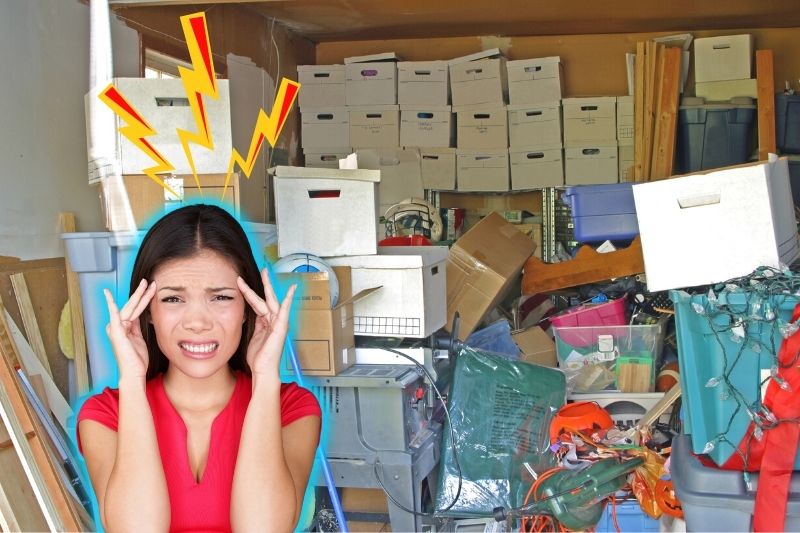Decluttering is an overwhelming task that is likely to be very physically and emotionally draining.
So, it’s no wonder that most of us delay actually starting the hard work. But the truth is, no matter how long we put off decluttering, those awful feelings we have when we go to tackle the mammoth task will still be present.
So, how do you start decluttering when you feel totally overwhelmed by the whole task? Easy, just read on and I’ll tell you how.
Handy Tips You Need to Know Before You Start Decluttering

Before you dive right into decluttering your home, office or a relative’s house you should take note of the following tips – they may just be exactly what you need to know right now!
- Decluttering is going to be a long process that could take months, so don’t be too disheartened if you don’t manage to remove all your clutter within a day.
- The decluttering process will probably never end entirely because it’s an ongoing process.
- Decluttering is not organising. And you should not start organising your room until the room has been completely decluttered.
- Break massive amounts of clutter down into tiny segments. They’re more workable and less intimidating like this.
- Focus on what you want to keep, rather than what you want to bin.
- Any decluttering process has to be viewed in a positive light. You’ve got to find something good in the activity, even if it’s just something small, like having a big enough space for a new TV at the end. You’ve got to have little motivators along the way!
- You’ll notice that decluttering is a physical workout as well as an emotional one. So don’t be too hard on yourself if you struggle with removing clutter from some rooms.
- You’ve got to set realistic and achievable goals for yourself. There’s no point telling yourself that you must declutter the whole house, attic included, over a Saturday and Sunday! Doing this will make you resent the process even more, and you’re less likely to actually achieve your goal.
- Accept that there will be days when decluttering just isn’t going to happen. And don’t worry about it – even if you have a decluttering plan in place, just do what’s right for you on the day.
- You shouldn’t be embarrassed of the decluttering process; everyone needs to do it at some point.
- Understand that nothing is supposed to be perfect, and clutter is part of life.
- Don’t burden yourself with negative thoughts, and stop second guessing your decisions all the time. Re-assessing all of your choices over and over again will only make you feel bad and it’ll slow you down.
- Try and make any decluttering process a good one, even if it is hard work and draining, because this experience probably won’t be your last one!
Let’s find out how you start to declutter a space when you feel overwhelmed by all the work involved.
How to Start Decluttering When You Feel Overwhelmed
It’s really easy to become completely overwhelmed by clutter, whether it be in your own home, at the office, or maybe you’re helping a relative to declutter their home. And the typical response is to shy away and to leave the work for another day, but this only makes things worse.
So, how can you rid yourself of those overwhelming feelings and get on with the job? Follow these steps:
1. Ask yourself why you’re decluttering in the first place

The first step before you start decluttering is to ask yourself, “Why am I decluttering?”
For some people the answer will be obvious, they need to get rid of the mess at home, others may need to declutter a house because they’re downsizing to a smaller home, and many other individuals will be decluttering a home of a relative.
The list of reasons can go on and on. But why is it so important to know ‘why’ you’re doing something?
The main reason is because people like to know why they’re doing something. We always want to find a reason for doing something in life, so we can justify our actions. And when that reason is discovered, it can be an excellent motivator, and make the task more satisfying.
For example, if you are moving to a new but smaller house, the reason why you’d be decluttering is because you don’t have enough space to take all of your belongings with you. By decluttering before you move, you can see exactly what you do/don’t want to take to your new house, and it’ll mean that you don’t have to worry about cluttering up an even smaller home when you get there.
You’re far more likely to get stuck in with the decluttering process when you can see exactly why you’re doing it, and there’s an obvious end goal.
When you know ‘why’ you’re decluttering, you can move onto the next step.
2. Create a plan
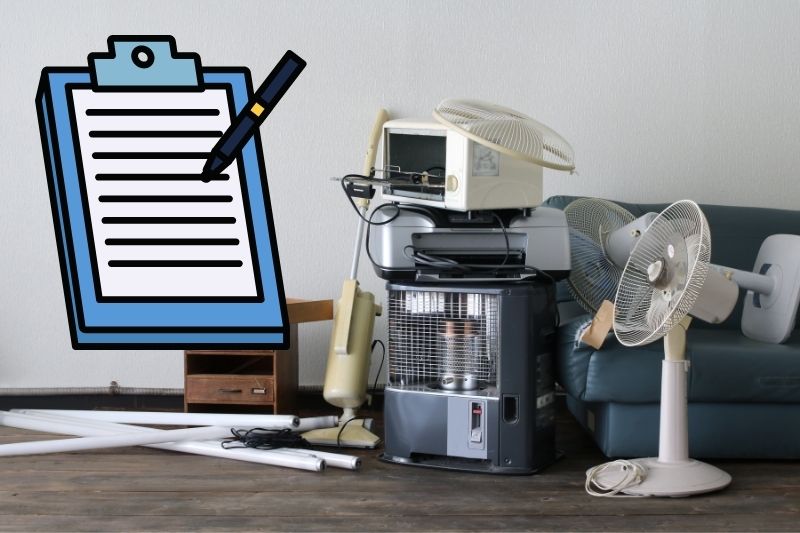
As odd as it may seem, the decluttering process will be a lot easier and more pleasurable for you, if you can create a plan to control some of the chaos.
Your plan should cover the following points:
Where are you going to be decluttering?
There are multiple ways you could answer this question:
- ‘I plan to declutter areas that are causing me the most stress’ – For example under the stairs/kitchen.
- ‘I plan on decluttering small areas’ – Like a drawer in the bedside cabinet.
- ‘I plan to work in a specific room at a time’ – Like the bathroom/bedroom.
- ‘I plan on decluttering the whole house’ – In this case you should start in one room, and work around to the other rooms one at a time.
There’s no right or wrong answer to the question above, and it usually comes down to personal preference. But it’s worth noting down where you’ll be starting your process first.
If you’re decluttering a relative’s house, for example, it might be worth starting off small and by decluttering the fridge and pantry areas. This is where mildew and mould are likely to form, so it’s necessary to act a little faster.
Next, decide what tactic to use to declutter.
Rubbish bag tactic
This is when you go to your specified location with a bin bag and you start going through items, and throwing things that you don’t want into a rubbish sack.
Although an extremely popular method, it’s not always ideal. Why? Because you might end up with a whole load of rubbish sacks that you’ll have to go through at a later date, to make sure you’ve not missed any items that need recycling.
Also, storing a whole load of bin bags isn’t easy, and this method can get quite chaotic, especially if you’ve got several people decluttering one room.
Rubbish sweep tactic
This is when you quickly throw items that you know are not wanted/needed anymore into a box/rubbish sack. This is usually done very quickly, because as the name suggests you just sweep obvious rubbish away.
It’s not the most effective decluttering method because usually when you declutter you have to go through various things, checking them and then putting them aside.
But as a quick trick to keep general clutter at bay this is an excellent idea!
Start at the doorway and work clockwise tactic
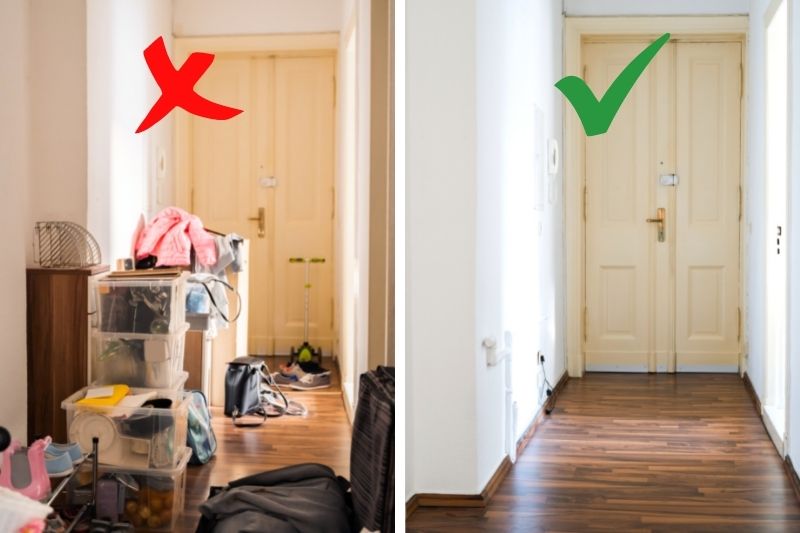
This method is the most thorough one, because this is when you go to your specified location, you stop at the doorway and you start to declutter the room in a clockwise motion. You move tiny steps at a time, and you make sure that all the clutter is disposed of before moving around the room.
During this method you would go through everything very thoroughly, so it would be more time consuming, but in terms of decluttering you’d be able to do a very good job.
Who will help you?
Decluttering is a stressful process. Not only are you likely to be quite tired from all the physical work, but you may be emotionally drained too.
So, it’s always worth having someone around to help you out when decluttering.
You can call on a partner, a neighbour, a sibling, anybody can help you declutter. And having help around may actually make the process more fun too, because you can reminisce and help each other out.
Consider how you’ll stay focused during this time.
One of the main issues when it comes to decluttering is that it’s hard to remain motivated and focused throughout the period.
As mentioned above, decluttering can be done quickly in some cases, but in many cases it’s a lengthy process that can take months. Trying to keep up the good work during this time isn’t actually easy. So, what can you do about it?
- Do 10-minute daily sprints – If long hours of decluttering start to get you down, just don’t do them. You’ll end up hating the decluttering process if you do this. Instead, practice 10-minute decluttering sprints every single day/every other day to keep you in high spirits. In a 10-minute sprint you can achieve a lot, even if you just clean out a drawer, you’ve achieved a huge amount!
- Will you make a game out of the decluttering process? – If you know that you’re going to be decluttering for a while, why not make a game out of it? It’ll make the process much more interesting to you and to anyone else you’ve called in to help you.
- Remind yourself of your ‘why’ – Don’t be afraid to look back at your plan to remind yourself why you’re doing all of the hard work. Sometimes revisiting your reason for doing something can increase your motivation and can re-energise you once again.
When your plan is in place it’s time to make sure you know what you’re going to be doing with all of the clutter.
3. Decide what you’re going to do with all the clutter
Decluttering a personal space can sometimes be quite an emotional process, so it’s sometimes hard to part with particular items. In this case, it’s important that you make sure that these precious goods go to the right place, if you really can’t keep them for yourself.
When it comes to rehoming your clutter, you’ve got a few options:
Donate

Donating goods is always a really good option, and it also means that your unwanted goods have a chance at a second life.
If you’ve got a lot of clothes that you no longer want there are always charity shops that are willing to re-sell your clothes. The same goes for books, furniture, artwork and lots of other items.
Sell
If you’ve got a lot of valuable items that you don’t mind parting with you could always try to sell the goods online. This is particularly true for any collectable items that you plan on throwing out. However, you can also sell clothes, bags, shoes and furniture online.
Bin
For items that are soiled, broken or are in very poor condition the best thing to do is to throw them in the bin, if they cannot be fixed. Try and recycle wherever possible.
On that note, if you plan on throwing out a lot of rubbish, it might be worth looking into a skip(s). You can arrange for a skip(s) to be delivered right to your location, and it’ll save you taking the rubbish back and forth to the recycling centre.
When you know where your clutter is going, it’s time to make sure you’ve got all your goods ready too.
4. Gather your cleaning goods
Just before you start decluttering it’s worth grabbing all the supplies, you’ll need to make your job a whole lot easier.
Here’s a list of what you might need:
- Bin bags
- Gloves
- Timer – good for timing sprints!
- Wipes
- Recycling bags
- Boxes
- Sellotape
Now, there’s only one thing left to do…
5. Start decluttering!
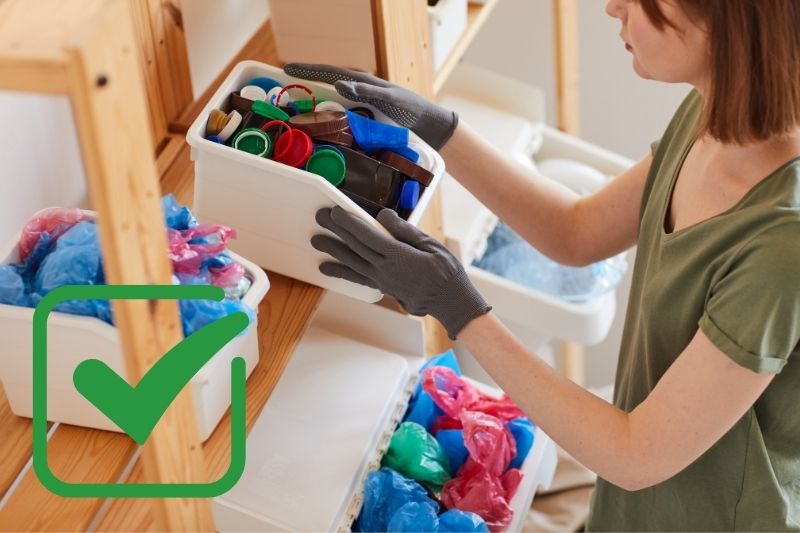
Once you’ve worked out your ‘why’, you’ve got your plan in place, you’ve decided where your clutter is going to go next, and you’ve gathered your supplies there’s only one thing left to do…
Start decluttering!
But hold on, what if decluttering isn’t for you, or you need help to declutter, what are you supposed to do? Keep on reading.
Are There Any Companies That Can Help You to Declutter in the UK?
There are a number of companies in the UK that specialise in decluttering. These services usually come with a variable price tag (see our guide on decluttering service prices). But usually for the price, companies offer specialised services that can help you to declutter specific areas in your home or even your whole house.
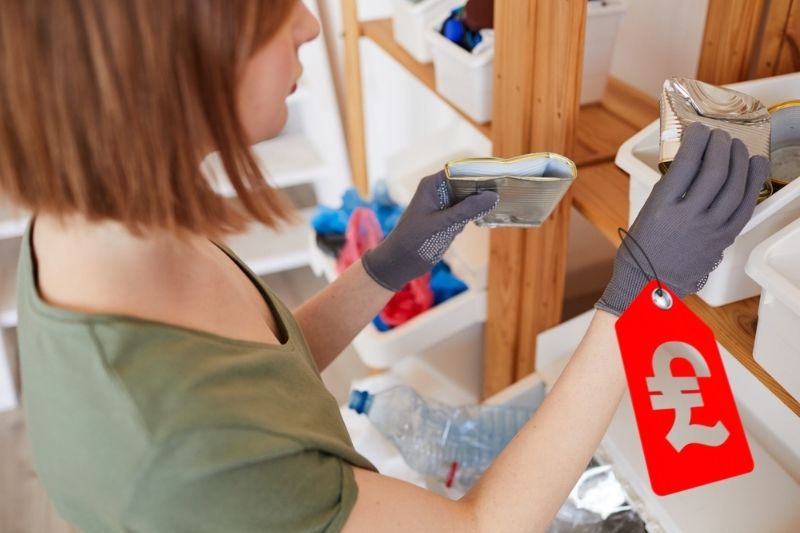
In addition to this, some decluttering companies in the UK offer virtual guidance to their customers, and they also provide emotional support during the process too.
If you choose to go with a decluttering service in the UK you should read up on the company you plan on using, read reviews, review prices and services, and decide what exactly you want decluttered.

Bethan has a passion for exploring, reading, cooking and gardening! When she’s not creating culinary delights for her family, she’s concocting potions to keep her house clean!
